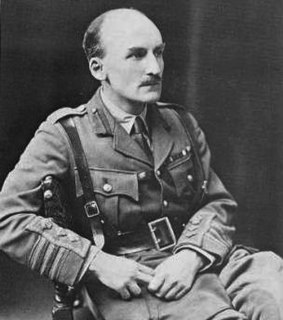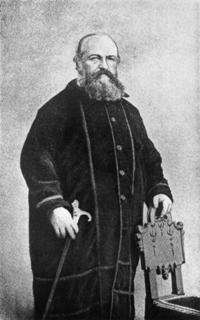A Quote by Saint Ignatius
He who aims at making an entire and perfect oblation of himself, in addition to his will, must offer his understanding, which is a further and the highest degree of obedience.
Related Quotes
A good stylist should have narcissistic enjoyment as he works. He must be able to objectivize his work to such an extent that he catches himself feeling envious and has to jog his memory to find that he is himself the creator. In short, he must display that highest degree of objectivity which the world calls vanity.
Such was the will of the Father that his Son, blessed and glorious, whom he gave to us, and who was born for us, should by his own blood, sacrifice, and oblation, offer himself on the altar of the cross, not for himself, by whom "all things were made," but for our sins, leaving us an example that we should follow his steps.
All true obedience comes from the heart. It was heart work with Christ. And if we consent, He will so identify Himself with our thoughts and aims, so blend our hearts and minds into conformity to His will, that when obeying Him we shall be but carrying out our own impulses. The will, refined and sanctified, will find its highest delight in doing His service. When we know God as it is our privilege to know Him, our life will be a life of continual obedience. Through an appreciation of the character of Christ, through communion with God, sin will become hateful to us.
Discipline is no longer literal obedience but intelligent obedience, for discipline aims at obedience coupled with activity of will. Once discipline weakens and vanishes, as it does towards the latter stages of the fire fight, and the crowd instinct possesses the soldier, then will he, if training has formed those necessary mental reflexes, surrender himself to the will of his leader; this is where leadership supplants discipline without destroying it.
We must never put our dreams of success as God's purpose for us; His purpose may be exactly the opposite. His purpose is that I depend on HIM and in HIS power NOW. His end is the process. It is the process, not the end, which is glorifying to God....His purpose is for this minute, not for something in the future. We have nothing to do with the 'afterwards' of obedience. If we have a further end in view, we do not pay sufficient attention to the immediate present; if we realize that obedience is the end, then each moment as it comes is precious.
A perfect historian must possess an imagination sufficiently powerful to make his narrative affecting and picturesque; yet he must control it so absolutely as to content himself with the materials which he finds, and to refrain from supplying deficiencies by additions of his own. He must be a profound and ingenious reasoner; yet he must possess sufficient self-command to abstain from casting his facts in the mould of his hypothesis.
Man—every man—is an end in himself, not a means to the ends of others; he must live for his own sake, neither sacrificing himself to others nor sacrificing others to himself; he must work for his rational self-interest, with the achievement of his own happiness as the highest moral purpose of his life.
Disregarding all evidence to the contrary, the student of Truth will maintain that he lives in a PERFECT Universe and among people potentially perfect. He will regulate his thinking to meet this necessity and refuse to believe in its opposite. At first he may be influenced by conditions, and he may appear weak, but as time goes on he will PROVE TO HIMSELF that his position is a correct one, for that which appears imperfect will begin to slip from his experience
The merit of Marx is that he suddenly produces a qualitative change in the history of social thought. He interprets history, understands its dynamic, predicts the future, but in addition to predicting it (which would satisfy his scientific obligation), he expresses a revolutionary concept: the world must not only be interpreted, it must be transformed. Man ceases to be the slave and tool of his environment and converts himself into the architect of his own destiny.
It should be the highest ambition of every American to extend his views beyond himself, and to bear in mind that his conduct will not only affect himself, his country, and his immediate posterity; but that its influence may be co-extensive with the world, and stamp political happiness or misery on ages yet unborn.
The common ground where the activities of God and man become one is the motive of perfect love; for in the last resolve love is the essence of God's nature. When he thinks, love is his thought; when he wills, love is the product of his will. To the degree, therefore, that man thinks and wills the good--to the degree that he realizes love in his finite dealings--he interfuses himself with God.
Saying yes to God isn't about perfect performance, but rather perfect surrender to the Lord day by day. Your obedience becomes radical the minute this desire turns into real action. Radical obedience is hearing from God, feeling His nudges, participating in His activity, and experiencing His blessings in a way few people ever do.










































